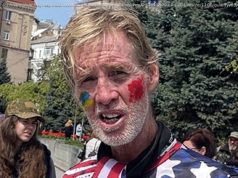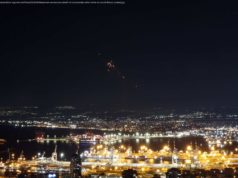With little more than a week before the chemical weapons panel’s mandate expires, doubts are growing about its future.
Russia on Tuesday ridiculed the findings of United Nations chemical arms investigators who faulted Syria ’s military for a lethal sarin attack on the Syrian village of Khan Sheikhoun last April, calling their report full of inconsistencies, omissions and possible fabrications.
“Systemic deficiencies have been found,” Russia’s deputy ambassador to the United Nations, Vladimir Safronkov, told the United Nations Security Council.
He called the report, submitted to the Council by an investigative panel on Oct. 26, “deeply disappointing” and emphasized that the investigators had never visited the site of the sarin attack.
Instead, he said, investigators concluded “everything could be determined without leaving your desk.”
The denunciation by Russia, the Syrian government’s most important ally, came after the leader of the panel that produced the report, Edmond Mulet, told Council diplomats that the findings reflected a “thorough, impartial and objective investigation.”
Acknowledging some gaps in information, he defended the panel’s decision not to visit Khan Sheikhoun, partly because of the presence of Islamist extremists and insurgents.
But he also said an analysis of soil samples from the site given to investigators by the Syrian authorities had established that the sarin’s chemistry was identical to the sarin that the Syrian government claimed to have purged or destroyed three years ago.
Other inconsistencies in the evidence, Mr. Mulet told the council, were “not of such a nature to change the assessment.”
Mr. Mulet’s report was extolled by the United States and other Western allies as scientific proof of what they called a pattern of atrocities tied to President Bashar al-Assad of Syria.
Nikki R. Haley, the United States ambassador, said the credentials of Mr. Mulet, a Guatemala statesman and longtime United Nations diplomat, were unimpeachable.
“Edmond is a man very much like the institution he heads — experienced, professional and independent,” Ms. Haley said.
Jonathan Allen, the deputy British ambassador, said the report had reached the “clear, unmistakable conclusion” that Syria’s government was responsible, and he denounced Russia’s response.
“Faced with science and fact, Russia has had no answer but fantasy and fiction, and has provided no evidence for its claims,” Mr. Allen said.
The contrasting assessments, while not unexpected, raise new worries that the repeated use of chemical weapons in Syria, a war crime, has been so politicized that those responsible will never be held to account.
The Security Council meeting took place 10 days before Mr. Mulet’s panel will have to cease work unless the Council members extend its mandate.
Known as the Joint Investigative Mechanism, the panel was created two years ago by the Security Council and the Organization for the Prohibition of Chemical Weapons, the group that monitors compliance with the treaty banning such arms. The panel’s purpose was to identify who has been using them in Syria.
The panel is in the midst of investigating dozens of other reports of chemical weapons use in Syria, including a possible sarin assault committed just a few days before the April 4 attack on Khan Sheikhoun, which killed about 100 people and injured 200.
The United States and Russia have circulated differing resolutions that would extend the panel’s mandate. It is unclear whether a compromise can be negotiated before the Nov. 16 expiration.
The Russian version, which would only extend the panel’s life for six months, calls for a more thorough examination of the Khan Sheikhoun attack before any conclusion is reached.
It also says investigators must embrace the “high standards” established by the treaty that bans chemical weapons, “which includes investigation, sampling, interviewing witnesses and collection of evidence and information on the site of an incident.”
The American version of the resolution, which originally called for a two-year extension of the panel’s mandate, has been shortened to 18 months. Other parts of the American version have been modified in recent days in part to address Russia’s criticisms.
Ms. Haley said such changes reflected diplomatic work “with our friends from Russia to ensure we can achieve a unanimous reauthorization.” But she also accused the Russians of pushing “unacceptable language only meant to undermine the investigators and divide this Council.”






